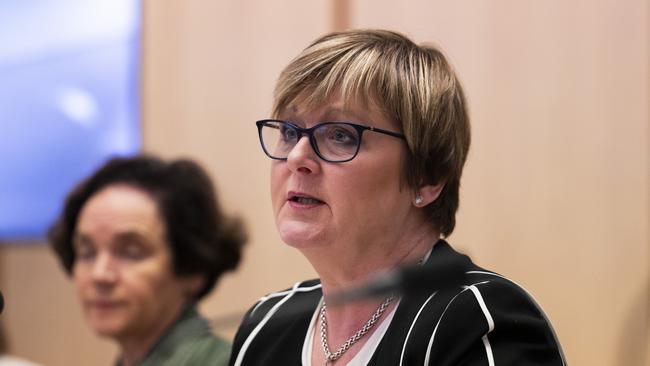NDIS complaints jump 20pc in a year
The AAT has seen an explosion in complaints relating to the NDIS with the vast majority finalised without a substantive hearing.

Complaints about the National Disability Insurance Scheme have jumped more than 20 per cent in the past year, with almost all being finalised without a substantive hearing.
There were 2160 complaints this financial year compared with 1780 in 2019-20, the Administrative Appeals Tribunal’s annual reports reveal.
The complaints come amid a fight over the future of the scheme, with the government arguing the cost of the NDIS is on an “unsustainable trajectory”. National Disability Insurance Agency data from August shows spending running 18 per cent higher than the same time last year.
Labor, the Greens and disability advocates, including the wife of former deputy prime minister Tim Fischer, have questioned the claims, saying it likely the $24bn scheme’s financial assumptions are wrong and are being used to justify contentious reforms such as the now-scrapped independent assessment program.
The AAT reports also show a 77 per cent increase in the number of cases that were not finalised by the end of the financial year – resulting in 1631 outstanding decisions – with the median time to resolve a case blowing out from five weeks to more than five months.
“The NDIS division comprises a small but steadily increasing proportion of the overall caseload: 2 per cent in 2018–19, 3 per cent in 2019–20 and 6 per cent in 2020–21,” the report says. “The NDIS division remained the case group with the highest proportion of cases (98 per cent) finalised without a hearing.”
Eight in 10 applications lodged with the AAT over the last financial year were to review decisions relating to support funded under a participant’s plan.
“Compared to previous reporting years, the composition of the (NDIS) division’s caseload changed significantly,” this year’s annual report says.
“Just over half of the applications lodged in 2019–20 were for review of decisions relating to supports … in this reporting year, there was a 76 per cent increase in applications for supports and a 47 per cent decrease in applications regarding access.”
Opposition NDIS spokesman Bill Shorten said the increase in appeals was being driven by the fact ordinary Australians were being forced to take the government to the tribunal to fight for what they were legally entitled to.
He said the AAT had become a battleground where the NDIA was hiring expensive private law firms to fight Australians with profound and severe disabilities.
“Ninety-eight per cent of cases brought to the AAT are ‘finalised’ without the AAT making a decision,” he said. “This suggests the NDIA are almost always settling on the steps of the court when threatened with the umpire’s verdict.
“The Morrison government must explain the huge increase in appeals and the blowout in finalising cases. The increase is a symptom of the Morrison government’s increasing attempts to cut the scheme by stealth.”
The number of AAT cases as a proportion of NDIS participants more than doubled from June 2020 to September 2021, but a spokeswoman for NDIS Minister Linda Reynolds said the total number of appeals represented “a very small number” of the 480,000-odd Australians benefiting from the scheme. “The Morrison government has introduced draft legislation that will better support participants through the appeals process,” she said.
The AAT’s 2020-21 annual report says the change in caseload was consistent with the rollout of the NDIS and the impact of COVID-19 on the delivery of allied health services.




To join the conversation, please log in. Don't have an account? Register
Join the conversation, you are commenting as Logout